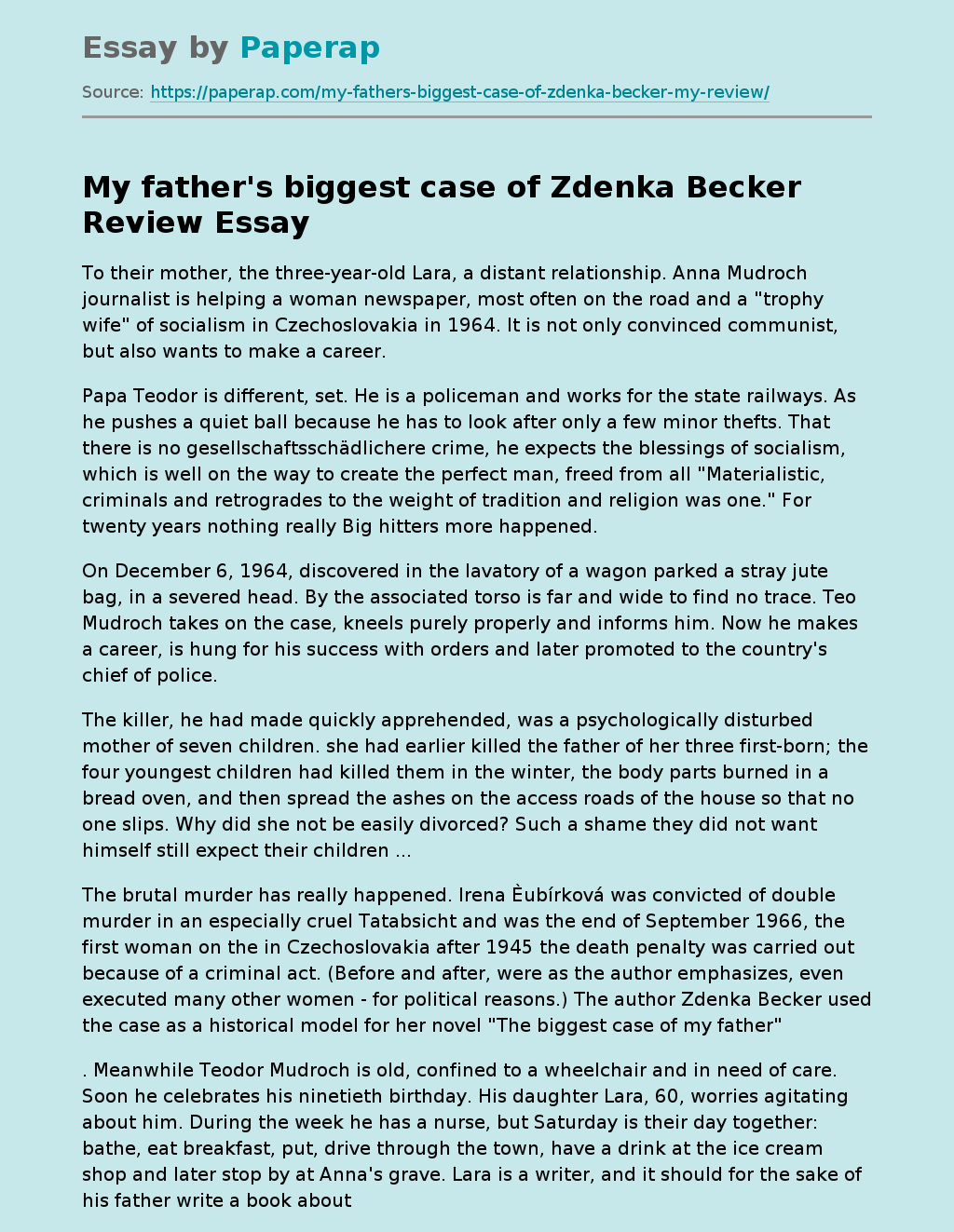My Father's Biggest Case Of Zdenka Becker Review
To their mother, the three-year-old Lara, a distant relationship. Anna Mudroch journalist is helping a woman newspaper, most often on the road and a “trophy wife” of socialism in Czechoslovakia in 1964. It is not only convinced communist, but also wants to make a career.
Papa Teodor is different, set. He is a policeman and works for the state railways. As he pushes a quiet ball because he has to look after only a few minor thefts. That there is no gesellschaftsschädlichere crime, he expects the blessings of socialism, which is well on the way to create the perfect man, freed from all “Materialistic, criminals and retrogrades to the weight of tradition and religion was one.
” For twenty years nothing really Big hitters more happened.
On December 6, 1964, discovered in the lavatory of a wagon parked a stray jute bag, in a severed head. By the associated torso is far and wide to find no trace. Teo Mudroch takes on the case, kneels purely properly and informs him.
Now he makes a career, is hung for his success with orders and later promoted to the country’s chief of police.
The killer, he had made quickly apprehended, was a psychologically disturbed mother of seven children. she had earlier killed the father of her three first-born; the four youngest children had killed them in the winter, the body parts burned in a bread oven, and then spread the ashes on the access roads of the house so that no one slips. Why did she not be easily divorced? Such a shame they did not want himself still expect their children.
The brutal murder has really happened. Irena Èubírková was convicted of double murder in an especially cruel Tatabsicht and was the end of September 1966, the first woman on the in Czechoslovakia after 1945 the death penalty was carried out because of a criminal act. (Before and after, were as the author emphasizes, even executed many other women – for political reasons.) The author Zdenka Becker used the case as a historical model for her novel “The biggest case of my father”.
Meanwhile Teodor Mudroch is old, confined to a wheelchair and in need of care. Soon he celebrates his ninetieth birthday. His daughter Lara, 60, worries agitating about him. During the week he has a nurse, but Saturday is their day together: bathe, eat breakfast, put, drive through the town, have a drink at the ice cream shop and later stop by at Anna’s grave. Lara is a writer, and it should for the sake of his father write a book about the case, who gave his life around, motivated him, gave him prestige.
When he takes insight into her manuscript, he is not happy what he reads about all there. Because there are other phases of his life to light. When he was still working as a young policeman at the track, he cared for his family. Goods from broken cars were worthless and were paid by the insurance; the disposal was for the police. So found clothing, fabrics, bananas, pineapples and many other things a way into the house Mudroch.
The meritorious police commissioner a criminal, a thief? That should please do not go public yet; if Lara could not rewrite the novel? It is necessary to preserve its impeccable reputation! “A brave bird does not poop in their own nest.”
Zdenka Becker has written a wonderful, warm-hearted novel. To the bizarre murder case that appears scarier in his succinct description when he was anyway, she weaves the loving father-daughter relationship and the struggle for the family past. The historical-political conditions of the scene play an important role, because every event is embedded in them, is influenced by them. Some keep the flag flying high: Czechoslovakia is a socialist advanced country, because “everyone works as much as he can, everyone gets what he needs.” These prescribed the people and by many internalized view thwarted the author with several swipes at the alleged achievements of socialism, the collective of equals, were in the some “equal”. In the double murderer’s socialist education obviously disastrously unsuccessful – a setback for the system. What Teodor Mudroch determined and what the perpetrator confesses therefore must remain secret. Lara but, at that time still in its adolescence, tells her friend what she is reading in secret in her father’s records and detective magazines; alone they can not handle it.
The images of cruel violence and topics such as “the fundamental difference between men and women who kill in a lifetime relationship their partner,” they attract and unsettling at the same time. Have their parents do not even grown apart? As a father recently hung a chandelier, mother should turn off the fuse, there was suddenly an electric shock, the father stretched out on the ground. Mother wanted to kill father in a particularly ingenious way? During this time, Lara developed an intense relationship of trust with her father, which accompanied him into his old age.
My Father's Biggest Case Of Zdenka Becker Review. (2019, Nov 18). Retrieved from https://paperap.com/my-fathers-biggest-case-of-zdenka-becker-my-review/

